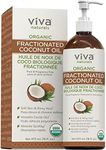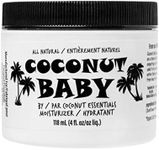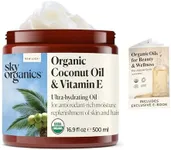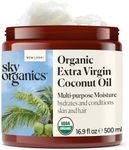Buying Guide for the Best Coconut Oil For Skin
Choosing the right coconut oil for your skin can make a big difference in how effective and pleasant it is to use. Coconut oil is popular for its moisturizing and soothing properties, but not all coconut oils are the same. When shopping, it's important to understand the key features that affect quality, purity, and suitability for your skin type and needs. By paying attention to these aspects, you can find a coconut oil that works best for your skincare routine.Type (Virgin vs. Refined)The type of coconut oil refers to how it is processed. Virgin coconut oil is extracted from fresh coconut meat without high heat or chemicals, preserving more natural nutrients and a stronger coconut scent. Refined coconut oil is made from dried coconut and is often deodorized and bleached, resulting in a more neutral scent and taste. If you want the most natural option with potential skin benefits, virgin coconut oil is usually preferred. However, if you dislike the coconut smell or want a lighter texture, refined oil might suit you better. Your choice should depend on your sensitivity to scents and your preference for natural ingredients.
Extraction Method (Cold-Pressed vs. Expeller-Pressed)Extraction method describes how the oil is taken from the coconut. Cold-pressed coconut oil is made without heat, which helps retain more nutrients and antioxidants, making it a popular choice for skincare. Expeller-pressed oil uses some heat, which can reduce nutrient content but may result in a lighter texture. If you want the highest nutrient content and a gentle oil for sensitive skin, cold-pressed is ideal. If you prefer a less intense coconut aroma or a lighter feel, expeller-pressed could be a good fit.
Purity (100% Pure vs. Blended)Purity indicates whether the coconut oil is pure or mixed with other oils or additives. 100% pure coconut oil contains only coconut oil, while blended products may include fragrances, preservatives, or other oils. For skincare, pure coconut oil is generally safer and less likely to cause irritation, especially for sensitive skin. If you have allergies or want to avoid unnecessary chemicals, always check the ingredient list and choose pure coconut oil.
Organic CertificationOrganic certification means the coconuts were grown without synthetic pesticides or fertilizers. Organic coconut oil is often considered safer for skin, especially if you are concerned about chemical residues. If you prefer natural and eco-friendly products, look for certified organic coconut oil. However, if this is less important to you, non-organic options can still be effective for skin care.
Texture (Solid vs. Liquid)Coconut oil can be solid or liquid at room temperature, depending on how it is processed and stored. Solid coconut oil melts easily in your hands and is great for targeted application, while fractionated (liquid) coconut oil stays liquid and is easier to spread over larger areas. If you want a quick-absorbing oil for massages or as a carrier oil, liquid coconut oil is convenient. For deep moisturizing or spot treatments, solid coconut oil works well. Your choice depends on how you plan to use it.
ScentThe scent of coconut oil can range from strong and natural to almost odorless, depending on processing. Virgin and cold-pressed oils usually have a noticeable coconut aroma, while refined oils are more neutral. If you enjoy the natural coconut smell, choose virgin oil. If you are sensitive to scents or want to avoid fragrance, refined or deodorized coconut oil is a better option.














